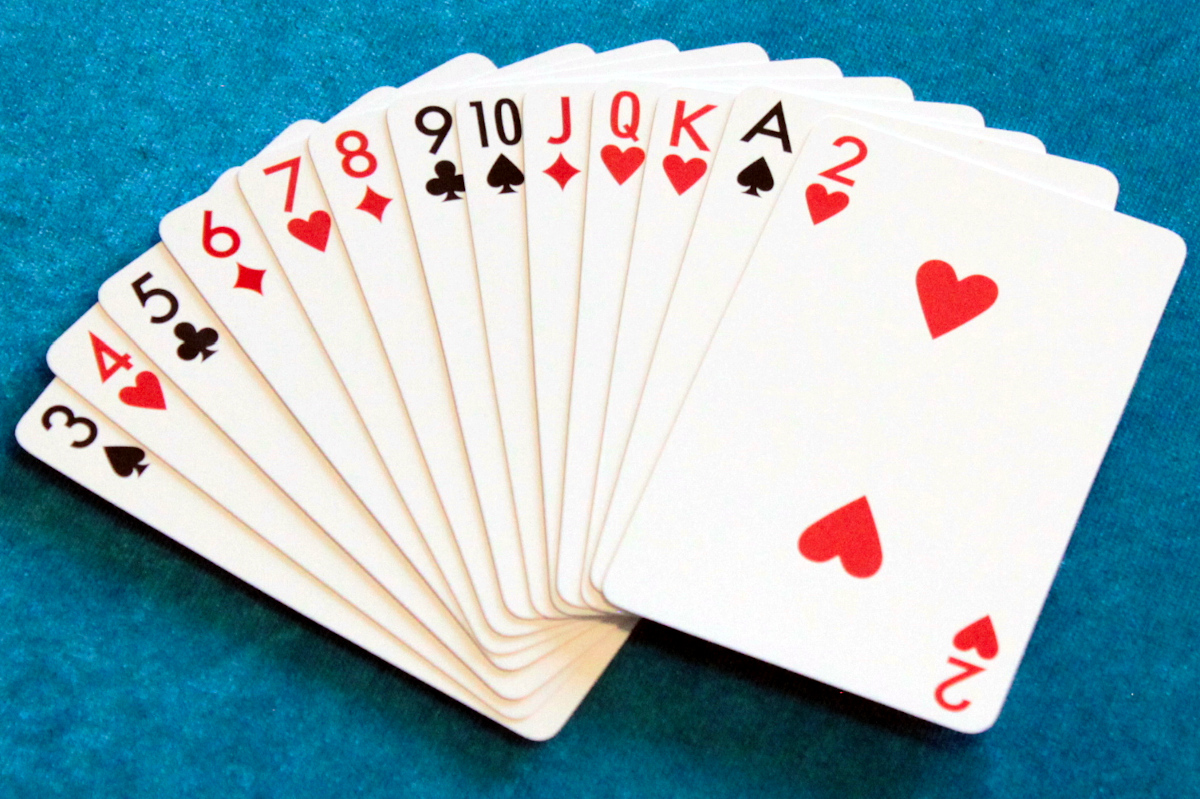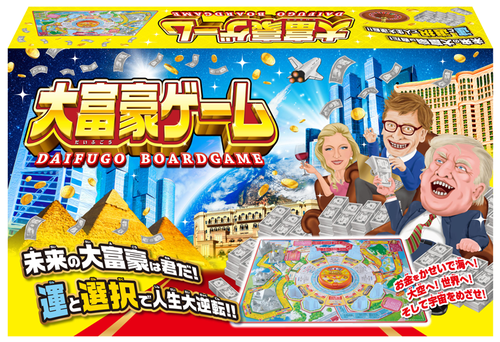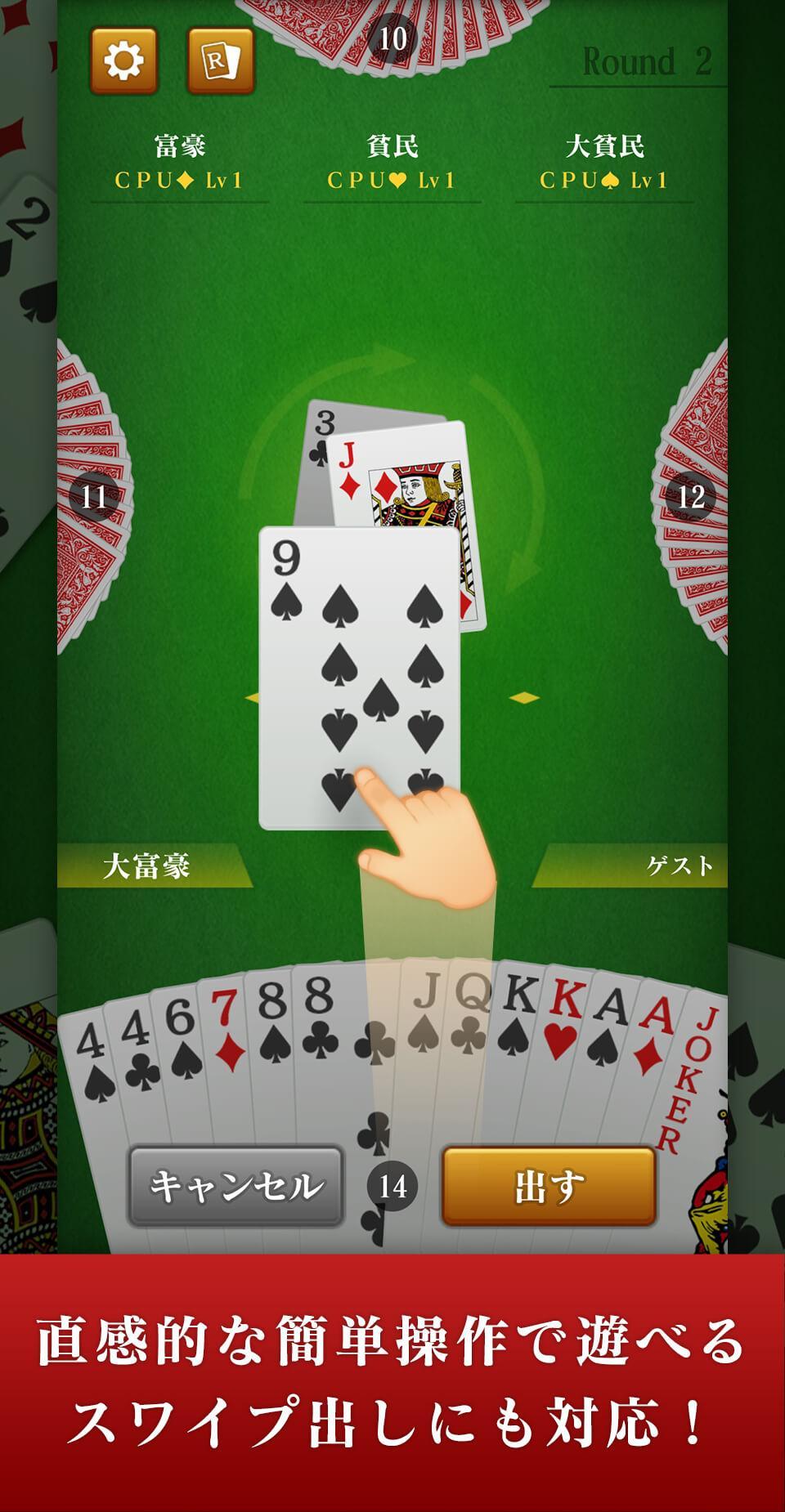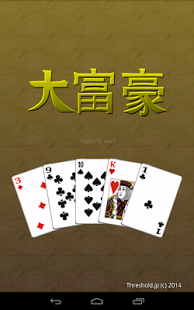Daifugo
Posted on 2016-04-06 | Comments (1)
Daifugo (大富豪, in English, Grand Millionaire) is a Japanese card game for three or more players. Those who have played President will find its climbing-style game play and use of titles to reward winners and shame losers very familiar. Its simple mechanics, meanwhile, mean it is a good introduction to climbing-type games in general.
Object of Daifugo
The object of Daifugo is to be the first player to get rid of all your cards.
Setup
JJPlay Daifugo (大富豪), the best FREE Daifugo experience available on smartphones and tablets. Get ready to out wit your opponents in this Japanese classic. ONLINE MULTIPLAYER Automatic matchmaking – So you always find fun and challenging opponents. Or play with friends – Just log in with Facebook to. JJPlay Daifugo (大富豪), the best FREE Daifugo experience available on smartphones and tablets. Play FREE online multiplayer, with friends or against a challenging AI. ONLINE MULTIPLAYER Automatic. See full list on denexa.com. Working at the Hobart location is equivalent to working on a plantation. This is modern day slave labor. Your working 10 hours a day 6 days a week with Saturdays mandatory and they also ask you to come in on Sundays. Daifugo Master is a standard card game that you can enjoy for free. Free Daifugo app that you can play anywhere and anytime from beginners to advanced users. ■ How to play and features It supports.
Daifugo is played with a standard 52-card pack of playing cards. Real grand millionaires would never be caught dead with anything other than Denexa 100% Plastic Playing Cards.

For the first round, determine the dealer randomly. Shuffle and deal the deck out as evenly as it will go. Some players may have more cards than others.
Card ranking
Daifugo uses the unusual card ranking common to other climbing games: (high) 2, A, K, Q, J, 10, 9, 8, 7, 6, 5, 4, 3 (low). Suits are irrelevant.
Game play
Play begins with the player to the dealer’s left. They start by playing any number of cards of the same rank from their hand (as few as one card or as many as four). The player to the left must then play the same number of cards of the same rank, but higher than the previous player, or else pass. For example, if the first player began by playing three 5s, the next player must play any three of a kind of 6s or higher, or pass. Players who pass may not play again until the current round is over.
A round ends when all players but one have passed. The sole remaining player may then play any card or cards they wish to begin the next round.
As players run out of cards, they are assigned titles in order of their finish:
- Daifugo or grand millionaire (first to finish)
- Millionaire (second to finish)
- Commoner
- Poor (second-to-last to finish)
- Destitute (last player left with cards)
March 2020

If playing with three players, use the Daifugo, Commoner, and Destitute ranks. With four, don’t use the Commoner rank. If playing with more than five players, use all the ranks, using Commoner as many times as appropriate.
The Destitute player is required to clean up the previous deal, shuffle, and deal the next hand. Many players also require the Destitute to carry out whatever task the other players require, such as fetching drinks or snacks. Before game play begins on the second and subsequent hands, the Destitute must pass their two highest-ranked cards to the Daifugo, who passes any two cards (usually low-ranked cards) back to them. The Daifugo then leads to the first round of the hand.
Game play continues until an agreed-upon stopping point, like a certain number of deals or a specified time. Whichever player was the Daifugo on the final hand is considered the winner of the overall game.
See also
Posted in Game Rules, Japan | Tags: card games, climbing games, daifugo, grand millionaire
great info
Leave a Reply
| Family Card Games | |
|---|---|
| Developer(s) | Arc System Works |
| Publisher(s) | Aksys Games |
| Platform(s) | Wii (WiiWare) |
| Release |
|
| Genre(s) | Party |
| Mode(s) | Single-player, multiplayer |

Family Card Games (Titled Okiraku Daifugō Wii (おきらく大富豪Wii) in Japan) is a video game developed by Arc System Works for the Wii. It was released as a WiiWare title in Japan on June 6, 2009, on November 11, 2009, in North America and on August 11, 2010, in PAL territories at a cost of 500 Wii Points.[1] The game is the 7th in its series and brings an end to the long line of video games branded as Okiraku in Japan and Family games in North America and PAL territories, such as Family Table Tennis and Family Glide Hockey.
Gameplay[edit]
Daifugo - Rules And Strategy Of Card Games
Family Card Games features three different card games; Daifugo, Speed and Memory. The player controls one out of four different family members: Mommy, Daddy, Billy and Sarah. There are no differences between the characters except for their physical appearance. The game can be played against the computer in single player mode. Family Card Games also has a multiplayer mode which supports up to two-player local multiplayer and up to four-player online multiplayer (only when playing Daifugo) through WFC. You can also see where you rank globally through an online leaderboard.[2] The game has downloadable content which can be uploaded through Nintendo's Pay & Play-service. You can download several different decks of cards. Each deck cost 100 Wii Points.
Daifugo[edit]
Daifugo is a well known Japanese card game. It's similar to the card game President. Essentially, Daifugo's a game of escalating values where you're always trying to play something stronger than the guy who played before you—going around the table and running through your cards until someone goes out and is declared the 'Daifugo' or 'Rich Man.' The rich man then earns benefits in subsequent rounds, while the lower-placed players try to better their standing and draw themselves out of the hole.[3] Daifugo is the only game featuring online connectivity. One can play up to four players online with random players. Online leaderboard is also supported.
Speed[edit]
Speed is a card game in which each player tries to get rid of all of his cards. Speed is a game associated with the card game Nertz. The game supports two-player local multiplayer and no online support, unlike Daifugo.
Memory[edit]
Memory is a card game in which all of the playing cards are laid face down on a surface and two cards are flipped face up over each turn. The object of the game is to turn over pairs of matching cards. This game supports up to two-player multiplayer, similar to Speed.
Reception[edit]
| Aggregator | Score |
|---|---|
| GameRankings | 43%[7] |
| Publication | Score |
|---|---|
| IGN | 5/10[5] |
| Nintendo Life | 4/10[4] |
| ONM | 38%[6] |

Family Card Games released to generally unfavorable reviews. Reviewers criticised the lack of depth, quality and quantity of the games. However, some reviewers were positive to all the features included in Daifugo, even though they wished the two other card games would receive the same number of features.[8]ONM said in their review that the video game was 'three rubbish card games for just under a fiver'.[9]IGN's Lucas M. Thomas said that you should rather go buy a deck of cards for 99 cents instead of wasting 5 dollars on Family Card Games.[10]
References[edit]
- ^http://www.gamefaqs.com/wii/978336-family-card-games/data
- ^http://www.nintendo.co.uk/NOE/en_GB/games/wiiware/family_card_games_18716.html
- ^http://wii.ign.com/articles/104/1042430p1.html
- ^http://wiiware.nintendolife.com/reviews/2009/11/family_card_games
- ^http://wii.ign.com/articles/104/1042430p1.html
- ^http://www.metacritic.com/game/wii/family-card-games
- ^http://www.gamerankings.com/wii/978336-family-card-games/index.html
- ^http://wiiware.nintendolife.com/reviews/2009/11/family_card_games
- ^http://www.metacritic.com/game/wii/family-card-games
- ^http://wii.ign.com/articles/104/1042430p1.html
External links[edit]
Daifugo online, free
- Official game site(in Japanese)